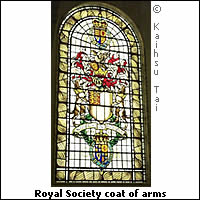Royal Society archive available on-line
The complete archive of the UK Royal Society's journals, which stretches back over 300 years, has been put on-line. Furthermore, until December 2006 access to this remarkable collection of almost 60,000 articles will be free of charge. Until now, online access to the Royal Society's journals stretched back only to 1997. The Royal Society's first peer-reviewed scientific journal, Philosophical Transactions, was launched in March 1665. Articles in the first ever issue include a description of some Italian research into better lenses for telescopes; an account of experiments into 'the properties of cold' by Robert Boyle and 'An Account of a Very Odd Monstrous Calf'. Over the centuries, many major scientific breakthroughs and discoveries have been reported in the Royal Society's journals. These include Halley's description of 'his' comet in 1705, the details of the DNA double helix, as described by Crick and Watson in 1954, Michael Faraday's electrical experiments, and groundbreaking research from the great 17th century rivals Robert Hooke and Isaac Newton. 'The Royal Society archive is a unique source of information for practicing scientists, science historians and indeed anyone with an in interest history,' said Professor Martin Taylor, Vice President of the Royal Society and Chair of the Publishing Board. 'The rich, varied and sometimes entertaining archive documents the earliest accounts of the seventeenth century's new experimental philosophy, through which an understanding of the natural world was acquired by experiment and observation. This provided the foundation of the modern scientific method.'
Countries
United Kingdom



